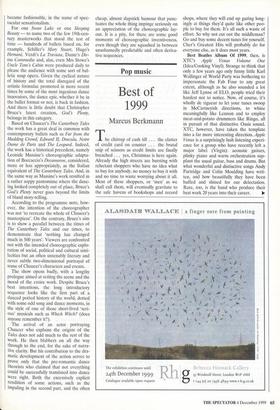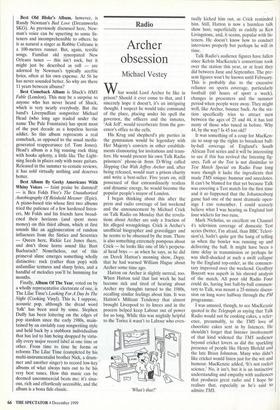Pop music
Best of 1999
Marcus Berkmann The chirrup of cash till ... the clatter of credit card on counter ... the brutal snip of scissors as credit limits are finally breached ... yes, Christmas is here again. Already the high streets are bursting with reluctant shoppers who have no idea what to buy for anybody, no money to buy it with and no time to waste worrying about it all. Most of these shoppers, or 'men' as we shall call them, will eventually gravitate to the safe havens of bookshops and record
shops, where they will end up gazing long- ingly at things they'd quite like other peo- ple to buy for them. It's all such a waste of effort. So why not cut out the middleman? Go and buy some decent tunes for yourself. Cher's Greatest Hits will probably do for everyone else, as it does most years.
Best Beatles Album Of 1999, then, is XTC's Apple Venus Volume One (Idea/Cooking Vinyl). Strange to think that only a few years ago only funny little Karl Wallinger of World Party was bothering to impersonate the Fab Four to any great extent, although as he also sounded a lot like Jeff Lynne of ELO, people tried their hardest not to notice. Now, of course, it's wholly de rigueur to let your tunes swoop in McCartneyish directions, to whine meaningfully like Lennon and to employ meat-and-potato drummers like Ringo, all in pursuit of that distinctive Oasis sound, XTC, however, have taken the template into a far more interesting direction. Apple Venus is a surprisingly lush listening experi- ence for a group who have recently left a major label (Virgin): acoustic guitars, plinky piano and warm orchestration sup- plant the usual guitar, bass and drums. But what wonderful and distinctive songs Andy Partridge and Colin Moulding have writ- ten, and how beautifully they have been buffed and shined for our delectation. Rare, too, is the band who produce their
best work 20 years into their career. ►
Best Old Bloke's Album, however, is Randy Newman's Bad Love (Dreamworks SKG). As previously discussed here, New- man's voice can be upsetting to some lis- teners and incomprehensible to others: he is as natural a singer as Robbie Coltrane is a 100-metres runner. But, again, terrific songs. Familiar old syncopated New Orleans tunes — this isn't rock, but it might just be described as roll — are adorned by Newman's typically acerbic lyrics, often at his own expense. At 56 he has never sounded better. So why are there 11 years between albums?
Best Comeback Album is Shack's HMS Fable (London). This may be a surprise to anyone who has never heard of Shack, which is very nearly everybody. But the band's Liverpudlian songwriter Michael Head (who long ago traded under the name The Pale Fountains) has spent most of the past decade as a hopeless heroin addict. So this album represents a real comeback, as opposed to the usual media- generated reappearance (cf. Tom Jones). Head's album is a big rousing rock thing with hooks aplenty, a little like The Light- ning Seeds in places only with more guitars. Released in the summer to ecstatic reviews, it has sold virtually nothing and deserves better.
Best Album By Geeky Americans With Whiny Voices — faint praise be damned!
— is Ben Folds Five's The Unauthorised Autobiography Of Reinhold Messner (Epic). A piano-based trio whose first two albums tried the patience of a few hardened listen- ers, Mr Folds and his friends have broad- ened their horizons (and spent more money) on this third album, which at first sounds like an agglomeration of random influences from the Sixties and Seventies — Queen here, Rickie Lee Jones there, and don't those horns sound like Burt Bacharach? Nonetheless, out of this primeval slime emerges something wholly distinctive: rock (rather than pop) with unfamiliar textures and sharp lyrics, and a handful of melodies you'll be humming for months.
Finally, Album Of The Year, voted on by a wholly representative electorate of one, is The Lilac Time's Looking For A Day In The Night (Cooking Vinyl). This is, I suppose, acoustic pop, although the dread word 'folk' has been used by some. Stephen Duffy has been loitering on the edges of pop stardom since the early 1980s, main- tained by an enviably easy songwriting style and held back by a stubborn individualism that has led to him being dropped by virtu- ally every major record label at one time or other. From time to time he forms or reforms The Lilac Time (completed by his multi-instrumentalist brother Nick, a drum- mer and another singer) to record low-key albums of what always turn out to be his very best tunes. How this music can be deemed uncommercial beats me: it's sinu- ous, rich and effortlessly accessible, and the album is a bona fide classic.



















































































 Previous page
Previous page